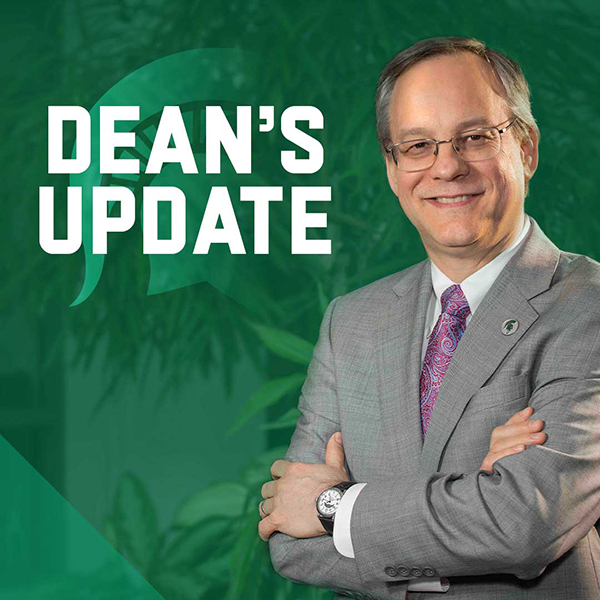Dean's Update
September 16, 2022 - Aron Sousa, MD
 Friends,
Friends,
Courage comes in many forms and from many people, and recently, we have witnessed remarkable courage from many of our colleagues. I’ll start with the College of Human Medicine’s own Karen Kelly-Blake, PhD. She is an associate professor in the fixed-term track and serves as the associate director of Bioethics and Social Justice as well as the chair of the MSU Faculty Senate and the Steering Committee. I thought she did a great job running the recent special MSU Faculty Senate meeting. And, I also want to call out Stephanie Anthony, Ed.D, an academic specialist (also in a fixed-term track) who serves as the director of University Outreach and Engagement’s College Access Initiatives and is the vice-chair of the MSU Faculty Senate and Steering Committee. (She is also part of the CHM diaspora!) If you have not read their thoughtful and courageous “Statement on Recent News Reports,” you should.
It is remarkable that two of the highest-level leaders in academic governance are not tenured, and, in fact, are not in the tenure system at all. Tenured faculty have real job security. Fixed-term faculty, academic specialists, and pre-tenure faculty, have shorter-term contracts between 1 and 5 years, depending on the faculty member’s employment track. Drs. Kelly-Blake and Anthony have job security based mostly on their own excellence, and they depend on people like you and me to have their backs if the politics get rough.
Their leadership speaks to the level at which the university is dependent on non-tenure system faculty and the expertise and leadership of fixed-term faculty. These faculty carry a large portion of the education effort and often develop particular expertise in teaching. Many, like Drs. Kelly-Blake and Anthony, are deeply involved in research and outreach. In professional schools, ranging from medicine to journalism, the practice-based faculty are usually not in the tenure system.
Dependance on these excellent faculty is not new to our college – we have chairs, associate deans, and interim deans who have been or are on fixed-term appointments. I am proud of how our college turns to all academic staff (faculty and academic specialists) for the core work of the college, including leadership. And, thanks to a long line of chairs, faculty leaders, and associate deans for faculty affairs, we have a robust, if highly detailed, system for evaluating fixed-term faculty for promotion. I believe we provide more opportunity for this kind of career development for our non-tenure stream faculty than most colleges. This is one of our strengths.
Another of our strengths (my freshman English teacher, Mrs. Gouveia, would not be happy with that transition…she would be right, but it is late), is our advancement and alumni teams. As you may recall, last year we raised a record amount of funds in support of student scholarships and endowed faculty positions. Stephanie Stotenbur, our director of advancement, heads that “small, but mighty team.” Stephanie has taken a new opportunity to lead advancement at the level of the Office of Health Sciences (OHS), and I am so happy for her. I mean, I am sad for us, but I know she will be a great help to the college as we work with OHS and university advancement. Stephanie has helped the college raise money for existential programs like the expansion in Grand Rapids, the Grand Rapids Research Center, faculty endowments, scholarships, and our most recent Mott Foundation gift. She has made so much possible at the college! Thank you, Stephanie, and see you in the next meeting!
As I close, I want to thank three other CHM faculty for their good work and courage: professors Sam Stanley Jr., MD, Teresa Woodruff, PhD, and Norman J. Beauchamp Jr., MD, MHS. Over the last six years, they have taken actions to prevent the failures of accountability that have bedeviled our university for many years. Those prior failures led to the trauma and injury of so many with additional costs to the university known to us all. Creating a new and different culture that does not put up with tolerating bad behavior requires taking difficult action against leaders who do not follow the new culture. Out of our scandals, these faculty have demonstrated Michigan State can do the work to reform itself. That is a great gift to this university to be appreciated by all Spartans.
Serving the people with you,
Aron
Aron Sousa, MD FACP
Dean

